
Veteran writer-actors Brian Sloan and Mark Sam Rosenthal have an undeniable rapport. Sloan already has a following, having penned films like WTC View and segments in the Boys Life anthology series. Rosenthal gained notice as a stand up comic and actor on the New York stage in productions like the parody Point Break Live!
The longtime friends behind the new web sitcom West 40s took a few minutes to chat with us about their show, mid-life, New York City, and how hookup apps are changing the world. The pilot episode is now live on YouTube.
So I had a chance to watch the pilot episode. What was the inception of West 40s?
Brian Sloan: We’ve been friends for almost 15, 16 years or so?
How about we take this to the next level?
Our newsletter is like a refreshing cocktail (or mocktail) of LGBTQ+ entertainment and pop culture, served up with a side of eye-candy.
Mark Sam Rosenthal: Yeah that’s about right. Since we were 20 or so.
BS: We met at the Stonewall bar on amateur strip night. Also, strangely enough, we weren’t participants, but we knew a number of the contenders for the title that night.
That seems like kind of a waste, frankly. How did the two of you meet if you weren’t participating?
MSR: We’re avid spectators.
BS: Oh yeah, we were definitely enjoying the show at the bar. And basically, that’s how we met. And then Mark Sam was like, “Why are you here?” And I was like,“oh, I know three of the contestants.”
MSR: At least Brian had that. I was like, “I like strippers.”
That’s funny.
BS: So we were friends from that point on. And I guess around 2012, we started working on another show, which was more of a dramatic series. Then after that, we sort of decided we wanted to do something that more reflected who we are. The other show was more serious and dramatic, and I guess we’ve had our dramatic moments, but our friendship is more built on the sense of humor that we share.
MSR: Yeah.
BS: And we just thought that might be a fun starting point. Then Mark Sam was living in Hell’s Kitchen, and mentioned, or came up with this idea for a title, West 40s, a show that was kind of about turning 40 I think, his age.
I see.
BS: And that was the very beginning of the idea, I think.
MSR: I think the West 40s humor is much more representative of our humor and our voice.
BS: Yeah, I think it’s very much more our personal sensibility. Basically, the show we wanted to make that was about what it was like to be in our 40s, or in Hell’s Kitchen, and what that was about, and how it was different from what we expected. And funnier too. I think that one of the main things we were sort of talking about when we were developing this idea was that it started about a show being in your 40s, and we realized fairly quickly that we really wanted this to be a fun show, not a fake middle age I kind of a depressing thing, which is how I kind of feel it’s usually handled. We wanted to give more of a light touch, and deal with coming at it through more—
MSR: More of a comic lens, yeah.
Watching it last night, it reminded me easily of Sex and the City because anything that’s funny and set in New York, that’s the standard. But also Golden Girls: people in middle age with great camaraderie.
MSR: That’s really funny because Golden Girls was not on my influence radar, although I guess subconsciously for every homosexual it is…
BS: It’s baked in, basically.
MSR: It seeps in. But basically, I was a little more inspired by some other more New York comedies that aren’t even necessarily gay, like Broad City…
BS: Broad City, definitely, just in the way it uses New York for the show was an influence to us.
MSR: The funny thing about that show is I avoided watching it for a few years because I thought it was going to make me feel old, because it’s about these really young women. And then the amazing paradox of it all when I finally did watch it, and discovered I loved it, is that it actually made me feel young. They’re living in a different time, they’re 25 in a different time than when I was 25. But it reminded me of oh my god, yes, when I was 25 in New York it was like that.
But yeah, the Sex and the City vibe is a little inescapable when you have a group of friends in New York, and they’re randy.
BS: I do remember when we were talking about the characters for this show, it was like, ok, we definitely need to have five guys. Because if it’s four, then we’re in trouble…
[Laughter]
BS: You know, if there’s five, you can’t be like oh, he’s the Samantha, he’s the Miranda… There’s one extra to throw everyone off.
MSR: So that’s the answer. It’s not like Sex and the City at all because there’s five.
I see, well…
[Laughter]
On a somewhat related subject, I saw an interview with Kim Cattrall right after I watched your pilot. She talked about why there would never be a Sex in the City 3, and that [the cast] were never friends. So there’s a void to be filled.
MSR: I was just out on Fire Island over the weekend, and Cynthia Nixon was out there fundraising.
BS: I think as far as our show goes, we’re all still friends. Is that right? The cast?

MSR: Yes, we are. Some of us were friends already.
BS: That’s true, a number of the cast sort of knew each other before this. And some of them we had in mind when we were writing the parts.
MSR: Yeah, definitely.
So that was going to be my next question—were these characters written with these actors in mind?
MSR: We knew half of them, so half of the characters were written with those two particular actors in mind. I’ve been friends for a long time with Jeff Hiller who plays Ryan, and John-Andrew Morrison, who [plays Franklin]. I’d been friends with them separately, then introduced them. We did things together, so they know each other through me. And we did conceive of their characters.
BS: And Mark Sam knew himself from previous work…
That’s good. Not everyone does.
MSR: That’s debatable.
Related: Hilarious new web series “West 40s” tackles gay sex in middle age
BS: But that part was conceived as part of the process too—that Mark [who plays TJ] would be in the show. And then Dan and Dalton came on as part of the casting process.
Very cool. How many days did the pilot take to shoot?
MSR: Three and a half days.
That’s quick.
BS: Time is money. We had three official shooting days, and then the half day was sort of our secret shooting day when we were shooting in the subway. Which we weren’t supposed to tell anybody.
Hey, I can’t be held responsible if the New York Transit Authority comes after you.
BS: The MTA has bigger problems than us right now. They gotta get their trains running, then they’ll come after us.
You have time then. So this is a show about men in their 40s. What kind of insight, with your own experience aging, with the community as the community has changed in the past 20 years—New York’s obviously changed too—what’s the key insight of the characters?
MSR: Well getting older, in general, brings up more perspective shifts, in terms of what things become less important to me, and what things become more important. And certainly, I think my own aging kind of mirrored a sort of larger gay trend—trend is the wrong word, but in terms of the fight for marriage—the things that we couldn’t do before. And obviously, long-term relationships have been around forever. But that does seem like something these 20-something kids want to—these 22-year-olds are getting married. And when I was 22, I was getting laid, and there was no interest in anything longer term for me for a long time, really, until I was 40. So that may just be like a really personal thing for myself, but I certainly think that’s my character’s journey. And I think that is connected to the sort of larger thing that’s happening in gay culture if you will. Does that sound right, Brian?
BS: Yeah, I mean, I think the one thing we were really interested in showing was a broad range of characters, in terms of how they’re all approaching their 40s. That’s what I found about my 40s—everybody kind of approaches it differently. I like that the show is sort of looking at these approaches. Like Dante (played by Matthew Montelongo) is somebody who’s kind of come into his own in his 40s in a way he never did in his 20s and 30s. Now, because of online hook-up apps, you can be this kind of Daddy King and find a hot young 20-something every night of the week. It’s a totally different world for him. I wanted to see, you know what’s that about? That’s a character who’s actually turned 40 and suddenly his whole life is much better than it was in his 20s.

MSR: Well also, when we were 20, we weren’t really into—I mean yes, there were no hookup apps—but I don’t recall this fascination with daddies, you know?
BS: Yeah, when I was in my 20s if somebody was over 30, you were just like, I’m not going to talk to him. I was sort of, why would you talk to him? He’s just an old person.
MSR: Well also, 20 years ago, there was less gay men of our age that were still around.
Well that’s the real elephant in this conversation, right? We basically lost two generations to AIDS, and so it just wasn’t possible.
MSR: It was not a thing. So that’s, you know…I never conceived of that, or thought about that, or talked to my friends about that as a younger gay man. But I started getting it from the other end as soon as I turned 40. Like, I turned 40, and I met this guy who was like “oh, that makes you an official DILF.” And I was like, ok, I guess I’m a DILF.
I say go with it.
BS: The first time you hear somebody call you “daddy” or “Papi” or whatever, it’s like, wait, what? But to somebody in their 20s, that’s who you are. You are Blanche, you are…
It’s kind of like a dissonance, because it’s how you’re seen, but not how you feel. And for me, that was something I was really interested in exploring in the show as well. Because yeah, the concept of what it is to be in your 40s now is different, and in ways, it’s new because of that generational loss. These are characters who, like me and Mark Sam, when we were in our 20s there wasn’t a cure for HIV, and you didn’t know what was going to happen if you got past 40. That would be like, news. So it’s a different thing for all these characters to explore that.
MSR: You couldn’t have made this show 20 years ago. I feel like the story is a totally different story because, you know, gay men in their 40s of the previous generations were just dealing with stuff that was totally different in the larger community that really dominated possibilities. And now we’re sort of the first out-gay generation not dealing with that. We’re living through middle age and looking forward.

So Season 1 is outlined to be six episodes?
BS: Yes.
So where are you in your fundraising?
BS: We did a Kickstarter for our pilot last year. What we’re doing now, we’re putting the pilot out as sort of a way to kind of announce the show, share the pilot and build an audience, and hopefully get some people to see that this show should continue, and find financing for the last five episodes of this season. That may be through Kickstarter. That may be through a very rich daddy, as opposed to us—we’re just daddies, not rich daddies or sugar daddies.
Important distinction.
MSR: It’s not beyond the realm. There’s a lot of people out there…gay guys of this demographic who really want to see this content, and some of them have the means to sort of partner with us. So that’s one possibility.
BS: We’re sort of putting the show out there to find the way forward for the rest of the season. But it is scripted, and really hope to start shooting again in Hell’s Kitchen this fall. If we find the right sugar daddy. Or production company.
The West 40s pilot is now live on YouTube.
Check out the trailer below:




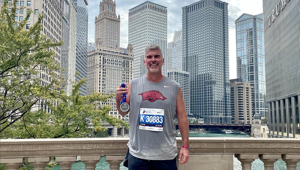
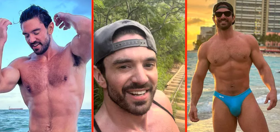

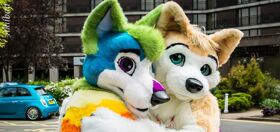

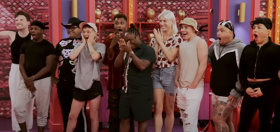






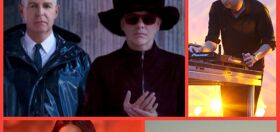




Chrisk
I’d say the show looking was more similar then sex in the city or the golden girls.
Interesting conversation about daddies and how aids took a generation from us.
Zambos271
I totally agree about losing two generations of gay men. We are still rebuilding from those losses.
fingertrouble
No daddies 20 years ago? What utter bollocks, I was chasing after daddy and older bear types at 23, and yes they were called that then, dadbod is not a new thing.
Also:
“Brian Sloan: We’ve been friends for almost 15, 16 years or so?
Mark Sam Rosenthal: Yeah that’s about right. Since we were 20 or so.”
*cough* and the rest…! No way either of those two are 35 unless they are joking…
Chrisk
Ha. I knew someone would call him on the math. I re-read it twice and I’m like girl.. Maybe there trying to describe the Grindr experience. I was also a little wtf about the whole daddy talk. I’m 50 and I sure know they existed back then. He says in place of daddy it was just anyone over 30 and they were just old and to be avoided. Are you kidding me? Lol
Aside from that I still found it interesting.
Giuseppe
So we’re supposed to believe that these guys are in their 40s and still sound like vapid valley queens? Is it too much to ask to NOT be fed more stereotypical gay bs, that just ISN’T FUNNY, at all. And if this is what is going on in NYC I must be in a bubble that I’m unaware of, I just don’t hang out with gay guys that behave/sound like this.
NOUHAVENT
Says the gay complaining bitterly, also not that kind of gay but still gay enough to visit gay social media. You’re typing a stereotype.
surreal33
Thank you, Thank you, Thank you!!! Why this brand of GARBAGE still exists is a mystery.
dbmcvey
I enjoyed the first episode. I am a bit older than the characters on the show but in my late ’30s I entered a monogamous relationship (which is still going on). I don’t see any characters in the show I relate to. My husband and I go out together with our friends (whether they’re single, coupled, in open relationships, etc…) I didn’t see any characters that I could directly relate to in that way. It seemed like there was a character who was married but the partner wasn’t around.
From the first episode it seemed like all the guys were looking for men in their ’20s. I have friends who do that but it always makes them feel really old. I find that stereotype of older gay men only being with much younger men kind of tiresome but I’ll keep watching.